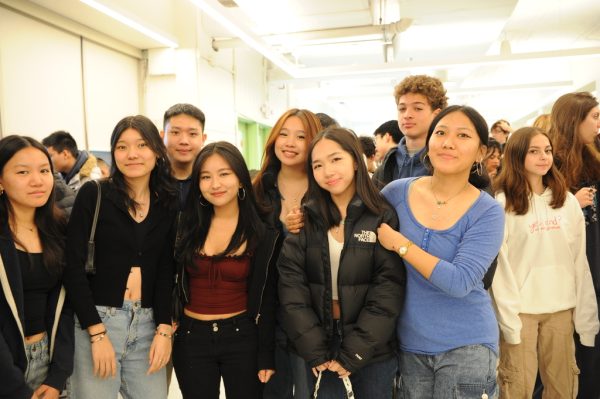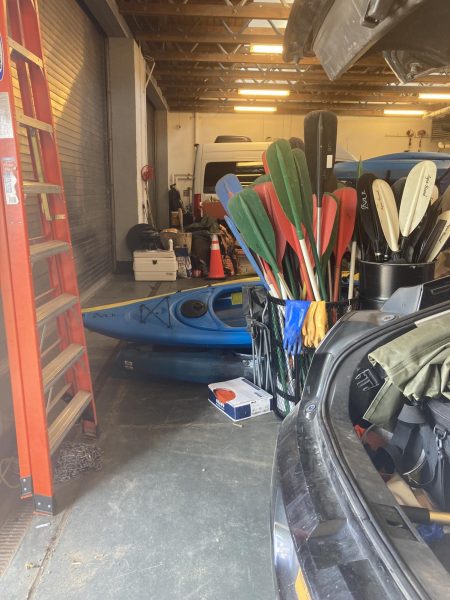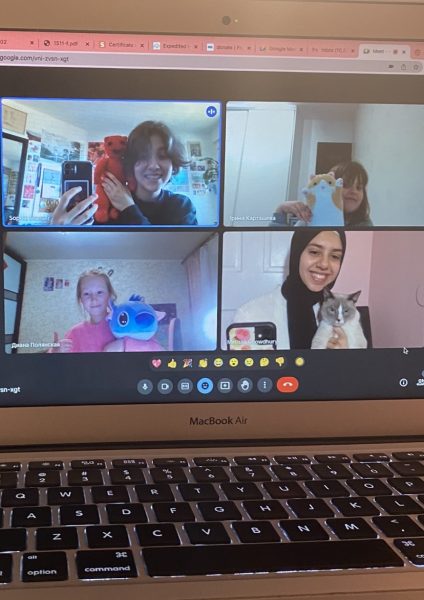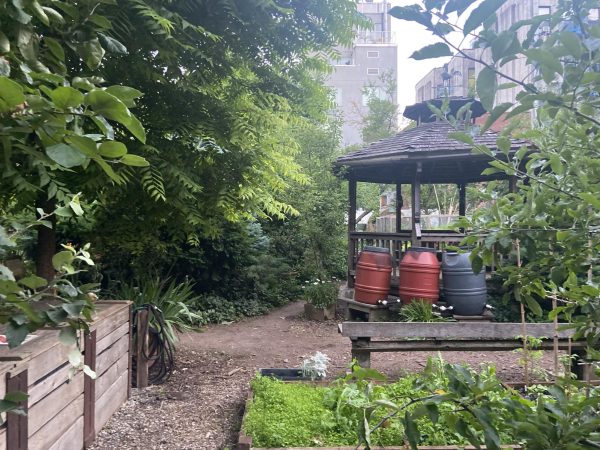May 2023 Advice Column: Achieving Success in the Spring Semester
The Copy Chiefs, Managing Editors, and Editors-in-Chief of ‘The Science Survey’ are here to answer your questions about navigating through the Spring semester successfully while practicing good mental health habits.
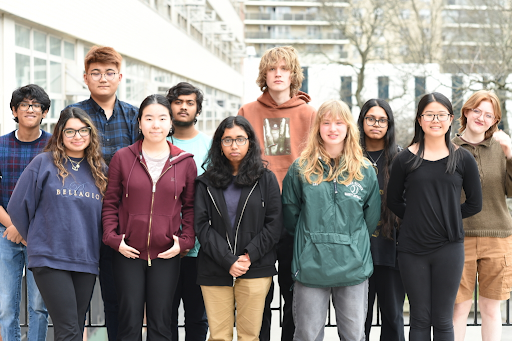
Managing Editors, Copy Chiefs, and Editors-in-Chief of ‘The Science Survey,’ the writers of the May 2023 Advice Column, pose for a photo. Depicted above, from left to right, are William Fernando ’23, Tiankuo Zhang ’23, Shahabir Sami ’23, Griffin Weiss ’24, Maliha Chowdhury ’24, Acadia Bost ’24, Aaminah Bukhari ’23, Charlotte Zhou ’24, Ayshi Sen ’24, Yasmine Salha ’24, and Jacey Mok ’24.
Hello, Bronx Science!
We, the Copy Chiefs, Managing Editors, and Editors-in-Chief of The Science Survey, are just as relieved as you are that the turbulent first semester has come to a close. Now, while the weather gets warmer and the days get longer, the second semester can mean lots of stress with course selection, exams, and college applications. However, it simultaneously signals a time of change and growth, and we, for one, are immensely proud of you and all your hard work so far. As you navigate through these next few months, we hope to offer advice and strategies for a successful spring semester – whether that be academic or personal. From SAT studying to recreational reading, we’ve all been in your shoes in some way or another, and through all your ups and downs, we believe in you. We know things can be tough, but don’t forget to take care of yourself!
With love,
Acadia Bost ’24, Shahabir Sami ’23, Ayshi Sen ’24, Tiankuo Zhang ’23, Maliha Chowdhury ’24, Charlotte Zhou ’24, Aaminah Bukhari ’23, William Fernando ’23, Jacey Mok ’24, Yasmine Salha ’24, and Griffin Weiss ’24
What is the best way to create a rigorous course load without overwhelming myself?
Maliha: When choosing what classes to take for the upcoming year, first understand your limits. Knowing how much you can take is crucial to make sure you don’t burn out. It’s easy to be influenced by your peers and their opinions on certain classes, but in the long term, that’s only going to do more harm than good. Every student has their own interests and schedule, both in and out of school. If you know your best friend is planning on taking AP Calculus BC, but you have difficulty with math, maybe following their lead isn’t the best idea. But if you know you’re somewhat good at physics, try going for AP and balance it out with a precalculus course or AP Calculus AB. The first few steps in creating a schedule is creating a list of some classes you’re interested in. Researching the specifics, like the calendar and syllabus, comes after. It’s about understanding yourself and your boundaries rather than following the crowd.
One of the most helpful tips when choosing classes is to ask for advice from previous students! Trust me, it’s not embarrassing to ask and other students would love to help out. If you’re planning on taking a specific course, ask upperclassmen from that class about how their year went. How much homework did you get each day? What was your teacher like? How hard were the tests? Questions like these can really help you understand the rigor and help you make your decision.
Finally, get an idea of your own work ethic. If you’re someone who knows they don’t do well under a lot of pressure and tends to procrastinate very often, then please do not overwhelm your schedule and drop your lunch period. School can be draining, and we all need breaks throughout the day. So unless you are absolutely, 100% sure you can handle it, and you’ve talked with someone else about it (such as your counselor; don’t be shy, ask them for help as well!) then do not drop your lunch period. If you can manage your work on a timely and organized basis, try going for harder classes! Every person is different. There is no need to feel ashamed if you don’t take as many APs as someone else. It’s all about understanding how much you are willing to take and maintaining your goals within a reasonable schedule.
This time period can be very stressful due to exams and upcoming college applications. What is a good way to keep myself motivated and avoid second-semester burnout?
Shahabir: The beginning of the spring semester can definitely be one of the most stressful times for any Bronx Science student, with pressure-inducing exams, the course selection process, worries regarding colleges, and more. However, these aspects should not take away from the beauty of the spring season: exciting changes to courses or schedules throughout the semester, new sports seasons, and, of course, the sun not going down before 5:30 p.m.! Here are some tips to ensure a fun and successful second semester:
First, set a routine. With things like counselor meetings, class assessments, and requests for qualifying courses during this time of the school year, it can be difficult to keep track of everything and that only advances stress. Structuring your day into a more organized schedule undoubtedly releases a great deal of stress. Making use of our school-provided planner is a great, practical way to help implement your routine. But the term “routine” does not have to specifically refer to an academic one. Also include your lifestyle habits; the maintenance of regular dietary, hygienic, and resting habits are integral in stimulating proper academic habits. A healthy body greatly contributes to a healthy mind, and there is no wealth or success without proper health. So first and foremost, be sure to take care of yourselves while also having fun during this splendid time of the year!
Next, remember that you are a brilliant student at a distinguished high school. With this comes various resources that are available at your disposable and intended to help anyone who seeks them out. If you feel overwhelmed, please reach out to the guidance department as they will be able to assist you and provide you with the proper resources going forward. A source of motivation for you to look forward to is the fact that YOU are a Bronx Science student. YOU are incredibly intelligent with a bright future ahead and so are your peers. Try to see past the competitive atmosphere, and instead, reassure yourself that you are in the right place and you are doing great just like the rest of your peers!
How can I balance school work with hobbies?
Tian: When trying to find the fine balance between school work and hobbies, it is most important to structure yourself and to realize when you’ve reached your limit. This starts with choosing the hobbies and classes you are genuinely interested in and ends with sacrificing the hobbies that overload you.
When discovering new hobbies to balance out the overwhelming amount of classwork, start off by creating a list of what you find interesting, order it by interest, importance to you, and accessibility, then see what hobbies consistently rank high in these lists, and try them out. If you enjoyed it, great, you now have a brand new activity to do after your classes and you can use it to advance yourself in new ways. If you did not, then eliminate it from the list and try the next. Repeat this process until you have about two or three activities that you find relaxing, and your schedule will be relatively balanced.
Another part of balancing schoolwork and hobbies is to not overbook yourself. If you’re doing a very time consuming activity such as sport or robotics, it may be best for you to not add in two or more other activities to your schedule.
If you have too many hobbies, you can do a similar process to prioritize those you like the most: create a list of hobbies and things you participate in, order the list by importance, enjoyment, and commitment. Then look at the commonly bottom ranked cards of that list and think, do I really need to do this activity? Do I spend enough time to really make this activity worthwhile? Do I really enjoy this activity? If any of these answers is ‘no,’ then you should reconsider whether that activity should still be on your hobby list. From there, cut down until you feel like you are no longer overbooking yourself.
Finally, you have to remember what is important. Your hobbies and interests are valid things to be concerned about, but schoolwork should still take priority. If your hobbies are starting to get in the way of your academics, shift your focus towards school work. You can always pick up and revisit hobbies down the line, but your schooling is only temporary.
How should I start preparing for AP exams in May?
Ayshi: When beginning to study for AP exams, it may be tempting to say, “I’ll start tomorrow.” But, no matter how nice that nap or the video game controller looks, start studying now. The key to a successful AP season is preparing early, especially if you are taking multiple exams.
For success during AP season, create a plan and stick to it. AP exams are tough and cover extensive lists of topics, so it is almost impossible to cram the night before. When creating a study plan, consider a few of the following questions: Are your exams close together — could they be the day after each other? Or will you have a few days in between the exams to get in some more review? Make sure to keep the deadlines in mind.
If your exams are all close to each other and earlier in May, it’s important to start early to create a balanced study schedule. While making a plan, consider the most difficult classes and their specific units. Allocate more time to the topics you struggled with earlier in your study schedule so you can dedicate more time to them. It’s easier to review and recall something you looked at two weeks ago than to look at it for the first time the night before the exam.
When you actually begin studying, make your own study guide. There is a common misconception that study guides are only helpful to see all the necessary information. In reality, study guides are great because they force you to look through your notes and understand what you have learned. Try to put everything into your own words rather than just copying the slides presentation word for word, and condense the information so that referring back to your study guide is quick and easy. While reading your friend’s 104 page study guide may be the most convenient option, making one for yourself will be far more beneficial. For history, also consider using mnemonics to memorize the key details. It helps to have an idea of the timeline of events and their causes and effects. For math and science APs, familiarize yourself with the formulas and any reference tables you may get on the day of the exam.
Practice problems are also crucial. On the College Board website, you’ll find almost all the past AP exams dating as far back as 1998. They will not only allow you to test how much you understand the material, but they also help you familiarize yourself with the actual exam format and question style. After you complete the problems and check your answers, spend a few minutes to understand what kind of questions you got wrong and why. This will help you recognize what you need to study more and what you have mastered.
Take advantage of the vast resources Bronx Science has to offer. SGI is a great place to ask questions of your teachers and to clear up any confusion about a topic with which you are struggling. Your teachers are well versed in the AP exam format and contents, and want you to succeed on your exams. You can also sign up for one-on-one NHS tutoring, where you will be paired up with students who took the class and exam already, so they can provide you with more personalized study tips and tricks for specific AP tests.
At the end of the day, remember that these are just tests. Be cognizant of your own mental and physical health. Even though APs can be stressful, it’s important to remain kind to yourself and give yourself breaks. Overloading your schedule and studying nonstop can cause you to burn out, ultimately doing more harm than good.
How can I study effectively for the SAT?
William: When I first started studying for the SAT, I was extremely overwhelmed with how much I had to cover, and I felt like I couldn’t properly study. I highly recommend using Khan Academy’s SAT practice. It was made in partnership with the College Board and has eight full length tests that you can take under real testing conditions. It will automatically score the test and, for me, it was a great indicator of how I performed on my real SAT. Plus, it’s completely free!
Here are some tips that I recommend to effectively study for the SAT:
Tip 1: Take a test before you start studying to benchmark your score.
Before you start studying, it is really important to know what you are good at and what you aren’t. If you notice you do more poorly on the Math than the English section, then you should allocate time accordingly. Understanding your strengths and weaknesses will be a critical component of understanding where your ability lies and what you need to improve. I recommend Khan Academy’s SAT diagnostic, which shows specific areas you need to work on!
Tip 2: Set REALISTIC study goals for yourself.
After a long, hard school day, if 10-20 minutes is all you can manage, that’s perfectly fine. The Khan Academy website allows you to set up your own SAT studying schedule, and you can ramp up the amount of time you spend studying as you get closer to the deadline. DO NOT study yourself to exhaustion. I promise that you will not retain the material you are learning and you will finish more stressed than you started. By setting manageable and realistic goals for yourself, you will not only have a concrete study plan, but you will also absorb what you are practicing.
Tip 3: Time Management – Skip questions and come back later.
This is arguably one of the most important things while taking the SAT. The clock is against you. You have to be time efficient and stick to the amount of time per question. As per the sunk cost fallacy, you are less likely to abandon something if you have already poured a lot of time into it. The SAT is exemplary of this because some questions will stump you and you will spend a lot of time trying to solve it. However, just because you have already spent 2 minutes on a question does not mean you should spend another 2 minutes at the expense of other questions. Stick to a reasonable pacing. All questions on the SAT are worth the same amount of points; you will not be penalized more for getting one question wrong than rather than another. It is far better to get a difficult question wrong and get two easier ones right than get the difficult one right and have no time for the other two.
Tip 4: The SAT is about recognizing patterns (especially in the grammar section).
Many questions on the SAT are formatted very similarly to questions in previous tests. Being able to identify what a question is asking you is critical to tackling difficult problems. Noticing what a question is asking you is something you need to train yourself for in order to excel on this exam. The best way to do this is by simply doing a lot of practice. Being able to identify what a question is asking you is often the hardest part of the exam, but knowing when to apply specific skills will be important to scoring well on the SAT. Make sure that you know WHY an answer is right (it’s easy to write it off in the English section as “It sounded right” or “It looked correct,” but really take the time to understand why you got it) and make sure you know how to apply the skills you learned.
Tip 5: Practice sensibly.
It’s important to find a foundational knowledge first. If you don’t know how to do the fundamentals, then no amount of practice will help you get better at the exam. On Khan Academy, there is a breakdown of every topic that you will need to study, along with videos of examples. You should take the time to learn the material before you try to solve the problems. It is equally important, if not more so than practicing a lot. Take the time to understand formulas or recognize conventional grammar to really tackle the SAT. The Internet is your best friend — utilize its resources to fill the gaps in your knowledge!
Tip 6: Understand the SAT!
In order to study for the SAT, you need to understand the test. This goes back to tips three and four because you need to know how to split your time well and recognize the patterns in the SAT but also know how the scoring breakdown works. Each test is graded a little differently. Sometimes getting one question wrong means 20 points off of a perfect score, and other times you can get 2 questions wrong before your score drops too drastically. Moreover, the College Board is REQUIRED to give one completely correct answer choice. If an answer choice is slightly wrong, then it is COMPLETELY wrong. This is a really important thing to look out for when eliminating answer choices, and knowing this helps you narrow down your answer.
The SAT is a difficult test, but it is particularly important to practice healthy studying habits, especially as you get closer to the exam. Take breaks, study with friends, or anything that can make this process less stressful! As you get closer to the exam, take tests under testing conditions and carefully review your wrong answers. Good luck on the exam!
Around our school campus, which food trucks/restaurants are the most affordable and delicious?
Griffin: There are great offerings all around the school, but never having any money has made me pretty ignorant of it all. If you are like me and find yourself never bringing money to school, you can do what I do and get in line for the DOE breakfast and lunch, free of cost and usually pretty good. Our cafeteria staff just introduced new fruit bars and breakfast packs full of yummy raisins along with our reliable and delicious hot food options. Partaking in the DOE offerings can be a great option for frugal students, but it can also get a little old. Luckily, Bronx Science is surrounded by a diverse selection of foods and cuisines at typically low costs to fit students’ budgets.
Food trucks like Tony’s and Ned’s sell great food with quick delivery times while also being in close proximity to the school, making them perfect for students who need to get lunch quickly. Tony regularly updates his Instagram with deals and sales making it an all around good choice to follow him.
For those who have more time on their hands after school, great food at low prices can be found at Jerome’s, the many bakeries, and the gas station all near the 4, B, and D train. Jerome’s is certainly worth the walk, with lower prices and what I would consider better food than most other trucks in the neighborhood. Additionally, Russian and Turkish bakeries line the walk to the B and D trains, with cheap prices for a lot of delicious food. If you are in the mood for something else, the pizza places around the subway stations are able to get a hot slice into your hands quickly and for only about three dollars. Finally, for students who don’t want to leave the comfort of our lovely campus and have a little more to spend, doordashing McDonalds, Popeyes, and KFC is usually pretty quick and reliable.
How can I stay safe in the MTA?
Yasmine: As someone who routinely takes naps on the D-train, this question is one I have not entertained as much as I should. That said, it is never too late to change habits, and given the recent climb in MTA-related acts of violence in recent years, I should definitely go about changing them.
So how can a person go about forming safe MTA habits? I will make a list for us both to follow.
Step 1: Stay aware! Reading, listening to music, scrolling on your phone, and especially falling asleep: these activities impair personal awareness. Being able to gauge your surroundings is an essential step to MTA safety given that you must be able to recognize danger in order to avoid it. Keep your senses unblocked… despite how soothing the alternatives may be.
Step 2: Commute smart. When riding the subway, this means keeping far away from the platform edge. If commuting at odd hours when train cars are mostly emptied, sit in the “Conductor car,” usually located in the middle of the train, and usually where the most people are. Both of these ideas can be applied to the public bus, too, in that it should be waited for safely on the pavement, and one should avoid sitting in the back.
Step 3: Be mindful of your appearance. Hide expensive jewelry, grip securely onto bags, and try to avoid prolonged eye contact with strangers. You never know who you may provoke! Along that vein, do not respond to physical or verbal harassment, as it will likely escalate into conflict.
What is the best way to research and find colleges that suit my interests?
Aaminah: The most important question to ask yourself when looking at colleges is whether or not YOU could see yourself living there and making that college your home for the next four years. When looking at colleges, it can be easy to be influenced by others’ thoughts and opinions. Whether parents, relatives, or friends, people may have an opinion on what college they think you should attend, or would be a good fit for, but you can’t let their opinions affect your decision. They aren’t the ones who will have to attend the classes or go to that school.
Before you research colleges, I suggest making a list of all the preferences you are looking for in a college. Whether it’ll be how big the school is, the location setting, or if they have good dining hall food, just note down your preferences. It’s better to have that information to start off, so you are not just researching universities and feeling overwhelmed by all the information. Try not to be persuaded on the colleges’ ranking or name. Look for a college that offers the most out of what you are looking for, not your friends or family. Remember, this is about YOU and YOUR FUTURE, not anybody else’s.
How do I overcome my fear of asking questions in class?
Jacey: At a school like Bronx Science, where it is easy to assume that everyone knows everything, asking questions can be a common fear. But asking questions is an essential part of the learning process! Not asking a question out of a fear of embarrassment will not help you understand; utilizing your teachers’ years of expertise will prove much more helpful. There are likely other students who have the same question in mind. When you take that leap of faith and ask a question, you are also helping your peers. A large part of this fear stems from our concern over how our peers may think of us. There are times when we feel like our questions are not good enough, or that our peers will think of us negatively. Whenever these thoughts arise, I recall a Chinese proverb: “He who asks is a fool for five minutes, but he who does not ask remains a fool forever.”
We are often worried about how others may perceive us when we ask a ‘silly question.’ This common phenomenon is called the “Spotlight Effect,” in which a person may believe that everyone is focused on their every move – especially their mistakes. The spotlight effect increases social anxiety, because we fear that others are constantly judging us. In reality, this usually is not the case. Do you remember the last time you made an embarrassing mistake? Probably. But do you remember the last time your peer(s) made an embarrassing mistake? Probably not. Point being, people are not judging you as much as you may think. What may seem like a source of embarrassment is likely not even noticed by those around you.
I encourage you to just ask the question. The best (and only) way to overcome this fear is by simply doing it. Although those nervous butterflies may not go away every time, you learn to be comfortable with them, coming to learn that they aren’t a big deal after all. Ask away!
How can I read more recreationally while balancing schoolwork?
Charlotte: The academic rigor of Bronx Science can be overwhelming, particularly in the later months of the year. While recreational reading is a great way to de-stress, it can also feel like a chore — especially since you probably already have mandated readings for English class. As an avid reader myself, I’ve had a lot of trouble balancing reading with academics, with more reading slumps than I can keep track of. Though once you put your mind to it, recreational reading is, in every way, worth it. It helps alleviate stress, hopefully makes you laugh, and connects you to the mind of the author. Portuguese writer Fernando Pessoa puts it best: “To read is to dream, guided by someone else’s hand.”
Luckily, there are a multitude of ways to ease yourself back into reading that aren’t as daunting as one may expect. A good place to start is your commute. This can mean listening to an audiobook, downloading an e-book, or carrying a physical book with you. In terms of audiobooks, Daisy Jones and The Six by Taylor Jenkins Reid stands out: since the book is written in an interview format, a full cast read-aloud brings these interviews and their respective characters to life. In general, reading fast-paced books, like thrillers or short stories, can help keep you hooked. A problem I often have with reading physical books is getting distracted by nearby screens and notifications, so on that front, e-books provide a middle ground to read while still satiating the urge to keep on scrolling.
Among my go-to recommendations is The Island of Missing Trees by Elif Shafak. Told by dual perspectives from the protagonist Kostas and a fig tree, this novel is incredibly unique and, in my opinion, underrated. It transcends two time periods, from a forbidden love story during the 1974 Cyprus coup d’état to Kostas’ daughter struggling to fathom her family history in the present day. On the other hand, if you enjoy watching book-to-movie or TV adaptations but haven’t read the original book, those are always interesting as well – The Queen’s Gambit by Walter Tevis and Crazy Rich Asians by Kevin Kwan are solid choices. Lastly, Time Is a Mother by Ocean Vuong is a poetry collection and a shorter read, but equally intriguing and moving. Following the death of his mother, it renews the central themes of family, loss, queerness, and language found in Vuong’s first collection On Earth We’re Briefly Gorgeous. From traditional verses to more innovative styles — as simple as a list of his mother’s Amazon history as a nail salon worker — every line is profoundly memorable.
While there are numerous tips out there to keep yourself in check for sticking to your reading goals, remember that recreational reading is supposed to be fun! Don’t force yourself to finish a book you don’t find engaging. If you are bored or don’t like the content, put it down and pick another one. You can always come back to it later.
How can I catch up if I’m falling behind in my classes?
Acadia: Catching up looks different for everyone, depending on your work ethic, schedule, and skillset. Still, I have a lot of experience falling behind in classes, and just as much experience catching up again, so some of my strategies might work for you. Here’s what I do:
1. Fight feelings of hopelessness. I don’t mean ‘stay positive all the time.’ I mean don’t let yourself believe you’re stuck, because you never, ever are. As soon as you start to think things are unsalvageable, or that you’re too far behind to catch up, you lose energy. Remember that you can (and will) bounce back.
2. Make a list. Lists are my lifesavers when it comes to catching up – I write down every assignment I have missed, every test I have coming up, and every deadline in the next few weeks. Based on this list, I set goals for myself – if I have 25 missing assignments but 10 of them don’t impact my grade that much, I prioritize the more important ones. If I’m behind in two classes and I have a test for one of them later in the week, I’ll prioritize re-learning material for that class.
I make a tentative schedule so that I can catch up on past work while still completing current assignments. With your schedule, be realistic. Take into account the time and energy you have each day, and the deadlines you have to meet. It’s important to make do-able goals — setting goals you won’t meet only makes it harder for you to get any work done.
3. Talk to your teachers. This one is so, so important – opening that line of communication shows maturity, and allows teachers a window into your experiences. The best way to do this is in person during SGI, but if that’s not possible, an email is perfectly fine. Tell them what’s happening, show them the schedule you made, and be honest. Nine out of ten times, they’ll be much more understanding than you’d expect.
Once you’ve turned in your missing work and caught up on studying old lessons, tell your teachers! If you notice this being a pattern, talk with your teachers frequently, before your work gets overwhelming.
Also, try to also talk to a parent or guardian! Lying or avoiding the subject causes a lot of stress for you and them. If you have parents you feel safe talking to, I highly suggest opening up to them at least a bit about what’s going on.
4. Done is better than perfect. If you have a five page essay and you can only write four pages, that’s okay. If you skip a few math questions you don’t understand so you can submit your worksheet, that’s okay. Getting an 85 on an assignment, or even a 75 or 60 (depending on your teacher’s late work policy), is so much better than getting a zero. Once it’s done, it won’t hang over your head anymore, and you can focus on putting your best foot forward in the future.
5. Hold yourself accountable. I use a technique called body doubling — working in the same room as/on call with friends or family — to keep myself on track. I tell them what I want to get done and tell them when I’ve accomplished it. I also downloaded an app that lets me block certain social media / entertainment on my phone while I work so I won’t be distracted. This may take a slightly different form for you, such as putting distractions in another room, studying with a group, or giving yourself rewards when you finish assignments.
This step is the most important of anything in this list. Even if you make a list and talk to people and have a good attitude, if you don’t actually do the work, you’re not going to get anywhere. So self assess! If you find yourself behind on your schedule, or getting distracted, try a new strategy, or get help from someone you can rely on to keep you on track.
Self reflection is key. Are you not understanding concepts you’re learning? Could you have a different learning style? Do you have trouble focusing or get distracted often? Is procrastination your main issue? Once you figure out what’s putting you in this cycle, you’ll be able to start breaking it.
If you think your experience in school may be related to your mental health (anxiety, bipolar disorder, OCD, etc.), you might not be able to get back on track without outside assistance. That’s perfectly okay — it doesn’t make you less smart or less driven. Our school has mental health resources and guidance counselors who can help you. If it’s an option for your family, seeing a therapist and/or a psychiatrist might be a good next step.
Finally, avoid burnout. If you’re overworking yourself, if you’re not making time for things that make you happy, your success will never be sustainable.
Be cognizant of your own mental and physical health. Even though APs can be stressful, it’s important to remain kind to yourself and give yourself breaks.
Acadia Bost is a returning Editor-in-Chief for ‘The Science Survey.’ Placing an emphasis in their writing on the more structural, long term problems...
Shahabir Sami is an Editor-in-Chief for the 'The Science Survey.' As an Editor-in-Chief, Shahabir provides the third and final overall edit for his peers’...
Ayshi Sen is an Editor-in-Chief for ‘The Science Survey.' Ayshi loves writing journalistic articles because they allow her to write in a way that is...
Tiankuo Zhang is an Editor-In-Chief for 'The Science Survey.' He sees journalism as something that has withstood the test of time and finds the transcriptions...
Maliha Chowdhury is an Editor-in-Chief and a Social Media Editor for ‘The Science Survey,’ and she enjoys the value of truth that is expressed in journalistic...
Charlotte Zhou is an Editor-in-Chief for ‘The Science Survey.’ In addition to writing and editing articles, she constructs the online crossword and...
Aaminah Bukhari is a Copy Chief for ‘The Science Survey.’ Her job is to edit her fellow peers’ articles to help them display their full writing potential....
Jacey Mok is an Editor-in-Chief for 'The Science Survey.' She loves the art of masterfully crafting a story and bringing the reader into the scene. She...
William Fernando is a Copy-Chief for ‘The Science Survey.’ William believes the gift of journalism is its undeniable ability to share moving and valuable...
Yasmine Salha is an Editor-in-Chief for ‘The Science Survey.’ She is a proponent of accessible journalism, and loves to simplify complex and controversial...
Griffin Weiss is an Editor-in-Chief of The Science Survey and enjoys writing about arts and culture. The most interesting aspect of journalism for Griffin...
Claire Elkin is a Copy Chief for ‘The Science Survey.’ She believes in the power of journalism and how it can shed light on topics and issues that...

